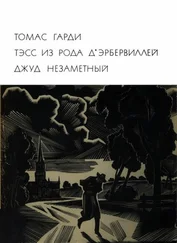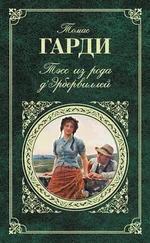| Nobody came near them, and their movements showed a mechanical regularity; their forms standing enshrouded in Hessian "wroppers"-sleeved brown pinafores, tied behind to the bottom, to keep their gowns from blowing about-scant skirts revealing boots that reached high up the ankles, and yellow sheepskin gloves with gauntlets. |
Никто не подходил к ним, и движения их были автоматическими и однообразными. Они работали в грубых робах - коричневых халатах, завязанных сзади, чтобы юбка не развевалась по ветру; ботинки поднимались выше щиколотки, руки были защищены желтыми рукавицами из бараньей кожи. |
| The pensive character which the curtained hood lent to their bent heads would have reminded the observer of some early Italian conception of the two Marys. |
Капоры с оборками придавали им задумчивый вид, и случайному наблюдателю эти склоненные головы напомнили бы двух Марий в изображении какого-нибудь итальянского художника эпохи раннего Возрождения. |
| They worked on hour after hour, unconscious of the forlorn aspect they bore in the landscape, not thinking of the justice or injustice of their lot. |
Они работали час за часом, не сознавая унылости картины, частью которой они были, и не задумываясь о том, справедлива ли к ним судьба. |
| Even in such a position as theirs it was possible to exist in a dream. |
Даже такая работа не мешала им предаваться мечтам. |
| In the afternoon the rain came on again, and Marian said that they need not work any more. But if they did not work they would not be paid; so they worked on. |
Потом пошел дождь, и Мэриэн сказала, что им можно бросить работу, но только в этом случае им ничего не заплатят: и они не ушли с поля. |
| It was so high a situation, this field, that the rain had no occasion to fall, but raced along horizontally upon the yelling wind, sticking into them like glass splinters till they were wet through. Tess had not known till now what was really meant by that. |
Плоскогорье было таким высоким, что под напором воющего ветра дождь хлестал горизонтально, колючий, как осколки стекла, и они промокли до костей - Тэсс впервые поняла, как это бывает на самом деле. |
| There are degrees of dampness, and a very little is called being wet through in common talk. |
Ведь промокнуть можно по-разному, и выражение "промокнуть до костей" часто пускают в ход по пустякам. |
| But to stand working slowly in a field, and feel the creep of rain-water, first in legs and shoulders, then on hips and head, then at back, front, and sides, and yet to work on till the leaden light diminishes and marks that the sun is down, demands a distinct modicum of stoicism, even of valour. |
Но работать на поле и чувствовать, как дождевая вода стекает сначала по ногам и плечам, потом по бедрам и голове, по спине, груди и бокам, и все-таки не бросать работы, пока не потемнеет свинцовое небо, возвещая заход солнца, - такая работа требует стоицизма и непреклонной воли. |
| Yet they did not feel the wetness so much as might be supposed. |
Однако они страдали от дождя меньше, чем можно было предположить. |
| They were both young, and they were talking of the time when they lived and loved together at Talbothays Dairy, that happy green tract of land where summer had been liberal in her gifts; in substance to all, emotionally to these. |
Обе были молоды, а разговаривали они о том времени, когда вместе жили и любили на мызе Тэлботейс, в этом благословенном зеленом уголке земли, где лето щедро раздавало свои дары. |
| Tess would fain not have conversed with Marian of the man who was legally, if not actually, her husband; but the irresistible fascination of the subject betrayed her into reciprocating Marian's remarks. |
Тэсс предпочла бы не говорить с Мэриэн о человеке, который по закону считался ее мужем, но эта тема была слишком увлекательна, и, помимо своей воли, Тэсс начала отвечать Мэриэн. |
| And thus, as has been said, though the damp curtains of their bonnets flapped smartly into their faces, and their wrappers clung about them to wearisomeness, they lived all this afternoon in memories of green, sunny, romantic Talbothays. |
Хотя мокрые оборки капоров били по лицу, а робы назойливо липли к телу - весь этот день, как уже говорилось, они жили воспоминаниями о зеленой, солнечной и романтической мызе Тэлботейс. |
| "You can see a gleam of a hill within a few miles o' Froom Valley from here when 'tis fine," said Marian. |
- В ясный день отсюда можно увидеть холм, который совсем рядом с долиной Фрум, - сказала Мэриэн. |
| "Ah! Can you?" said Tess, awake to the new value of this locality. |
- Да неужели! - воскликнула Тэсс, оценивая новое достоинство этой местности. |
| So the two forces were at work here as everywhere, the inherent will to enjoy, and the circumstantial will against enjoyment. |
Итак, здесь, как везде, боролись две силы: врожденное стремление к счастью и ему препятствующая сила обстоятельств. |
| Marian's will had a method of assisting itself by taking from her pocket as the afternoon wore on a pint bottle corked with white rag, from which she invited Tess to drink. |
У Мэриэн был особый метод поддержания бодрости духа: к концу дня она извлекла из кармана пинтовую бутылку, заткнутую белой тряпкой, и предложила Тэсс выпить. |
| Tess's unassisted power of dreaming, however, being enough for her sublimation at present, she declined except the merest sip, and then Marian took a pull from the spirits. |
Но сейчас Тэсс довольствовалась своими мечтами и не нуждалась в искусственном подхлестывании. Она сделала только маленький глоток, но Мэриэн хлебнула основательно. |
| "I've got used to it," she said, "and can't leave it off now. |
- Привыкла я к спиртному, - сказала она, - и теперь ух не могу отвыкнуть. |
| 'Tis my only comfort-You see I lost him: you didn't; and you can do without it perhaps." |
Единственное мое утешение! Видишь ли, я ведь его потеряла, а ты нет... вот потому ты и можешь обходиться без спиртного. |
| Tess thought her loss as great as Marian's, but upheld by the dignity of being Angel's wife, in the letter at least, she accepted Marian's differentiation. |
Тэсс думала, что потеряла она не меньше, чем Мэриэн, но спорить не стала: все-таки она считалась женой Энджела, и эта мысль ее поддерживала. |
| Amid this scene Tess slaved in the morning frosts and in the afternoon rains. |
Вот так работала Тэсс в утренние заморозки и в дождливые дни. |
| When it was not swede-grubbing it was swede-trimming, in which process they sliced off the earth and the fibres with a bill-hook before storing the roots for future use. |
Когда не нужно было выкапывать брюкву, они ее чистили, то есть кривым ножом соскребали присохшую землю и срезали корешки, а затем ее ссыпали на хранение. |
| At this occupation they could shelter themselves by a thatched hurdle if it rained; but if it was frosty even their thick leather gloves could not prevent the frozen masses they handled from biting their fingers. |
Этой работой они могли заниматься под навесом, если шел дождь; но в морозные дни даже толстые кожаные перчатки не защищали пальцев от холода, когда приходилось-перебирать мерзлые комья. |
| Still Tess hoped. |
Тем не менее Тэсс не теряла надежды. |
| She had a conviction that sooner or later the magnanimity which she persisted in reckoning as a chief ingredient of Clare's character would lead him to rejoin her. |
Она была убеждена, что рано или поздно великодушие, которое она по-прежнему считала основной чертой Клэра, одержит верх и побудит его вернуться к ней. |

![Томас Вулф - Взгляни на дом свой, ангел [английский и русский параллельные тексты]](/books/32195/tomas-vulf-vzglyani-na-dom-svoj-angel-anglijskij-thumb.webp)
![Агата Кристи - На краю [английский и русский параллельные тексты]](/books/32247/agata-kristi-na-krayu-anglijskij-i-russkij-paralle-thumb.webp)
![Сакс Ромер - Ведьмино отродье [английский и русский параллельные тексты]](/books/33237/saks-romer-vedmino-otrode-anglijskij-i-russkij-thumb.webp)
![Агата Кристи - Объявлено убийство [английский и русский параллельные тексты]](/books/33247/agata-kristi-obyavleno-ubijstvo-anglijskij-i-russ-thumb.webp)
![Фрэнсис Фицджеральд - По эту сторону рая [английский и русский параллельные тексты]](/books/34130/frensis-ficdzherald-po-etu-storonu-raya-anglijskij-thumb.webp)

